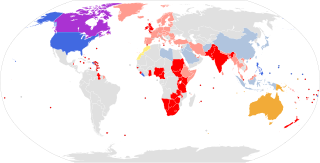
The Oxford English Dictionary (OED) is the principal historical dictionary of the English language, published by Oxford University Press (OUP), a University of Oxford publishing house. The dictionary, which published its first edition in 1884, traces the historical development of the English language, providing a comprehensive resource to scholars and academic researchers, and provides ongoing descriptions of English language usage in its variations around the world.

A backronym is an acronym formed from an already existing word by expanding its letters into the words of a phrase. Backronyms may be invented with either serious or humorous intent, or they may be a type of false etymology or folk etymology. The word is a portmanteau of back and acronym.
Cunt is a vulgar word for the vulva. It is used in a variety of ways, including as a term of disparagement. "Cunt" is often used as a disparaging and obscene term for a woman in the United States, an unpleasant or objectionable person in the United Kingdom and Ireland, or a contemptible man in Australia and New Zealand. In Australia and New Zealand, it can also be a neutral or positive term when used with a positive qualifier. The term has various derivative senses, including adjective and verb uses.
"Chav", also "charver", "scally" and "roadman" in parts of England, is a British term, usually used in a pejorative way. The term is used to describe an anti-social lower-class youth dressed in sportswear. The use of the word has been described as a form of "social racism". "Chavette" is a related term referring to female chavs, and the adjectives "chavvy", "chavvish", and "chavtastic" are used to describe things associated with chavs, such as fashion, slang, etc. In other countries like Ireland, "skanger" is used in a similar manner. In Ontario, the term is "hoodman", an equivalent of the term "roadman" used in England. In Newfoundland, "skeet" is used in a similar way, while in Australia, "eshay" or "adlay" is used.

Susie Dent is an English lexicographer, etymologist, and media personality. She has appeared in "Dictionary Corner" on the Channel 4 game show Countdown since 1992. She also appears on 8 Out of 10 Cats Does Countdown, a post-watershed comedy version of the show.
The word(s) of the year, sometimes capitalized as "Word(s) of the Year" and abbreviated "WOTY", refers to any of various assessments as to the most important word(s) or expression(s) in the public sphere during a specific year.

Despite the various English dialects spoken from country to country and within different regions of the same country, there are only slight regional variations in English orthography, the two most notable variations being British and American spelling. Many of the differences between American and British or Commonwealth English date back to a time before spelling standards were developed. For instance, some spellings seen as "American" today were once commonly used in Britain, and some spellings seen as "British" were once commonly used in the United States.

Hart's Rules for Compositors and Readers at the University Press, Oxford is a reference book and style guide published in England by Oxford University Press (OUP). Hart's Rules originated as a compilation of best practices and standards by English printer and biographer Horace Hart over almost three decades during his employment at other printing establishments, but they were first printed as a single broadsheet page for in-house use by the OUP in 1893 while Hart's job was controller of the university press. They were originally intended as a concise style guide for the staff of the OUP, but they developed continuously over the years, were published in 1904, and soon gained wider use as a source for authoritative instructions on typesetting style, grammar, punctuation, and usage.
Wordhunt was a national appeal run by the Oxford English Dictionary, looking for earlier evidence of the use of 50 words and phrases in the English language. New evidence found by members of the public in response to the appeal appears in the Oxford English Dictionary. The appeal is a companion to the BBC2 television series Balderdash and Piffle.
Oxford spelling is a spelling standard, named after its use by the Oxford University Press, that prescribes the use of British spelling in combination with the suffix -ize in words like realize and organization instead of -ise endings.
Balderdash and Piffle is a British television programme on BBC in which the writers of the Oxford English Dictionary asked the public for help in finding the origins and first known citations of a number of words and phrases. Presented by Victoria Coren, it was a companion to the dictionary's Wordhunt project.
A pronunciation respelling for English is a notation used to convey the pronunciation of words in the English language, which do not have a phonemic orthography.

The Oxford "-er", or often "-ers", is a colloquial and sometimes facetious suffix prevalent at Oxford University from about 1875, which is thought to have been borrowed from the slang of Rugby School. The term was defined by the lexicographer Eric Partridge in his Dictionary of Slang and Unconventional English.
Patrick Wyndham Hanks was an English lexicographer, corpus linguist, and onomastician. He edited dictionaries of general language, as well as dictionaries of personal names.

"The full monty" is a British slang phrase of uncertain origin. It means "everything which is necessary, appropriate or possible; 'the works'". Similar North American phrases include "the whole kit and caboodle", "the whole nine yards", "the whole ball of wax", "the whole enchilada", "the whole shebang", or "[going] the whole hog".
In lexicography, antedating is finding earlier citations of a particular term than those already known.

Grace Dent is a British columnist, broadcaster and author. She is a restaurant critic for The Guardian and from 2011 to 2017 wrote a restaurant column for the Evening Standard. She is a regular critic on the BBC's MasterChef UK and has appeared on Channel 4's television series Very British Problems.
Orin Hargraves is an American lexicographer and writer. His language reference works include Mighty Fine Words and Smashing Expressions: Making Sense of Transatlantic English, Slang Rules!: A Practical Guide for English Learners, and Words to Rhyme With: A Rhyming Dictionary. In addition he has contributed definitions and other material to dictionaries and other language reference works issued by Oxford University Press, Cambridge University Press, Longman, Macmillan, HarperCollins, Chambers Harrap, Langenscheidt, Berlitz, Scholastic Corporation, and Merriam-Webster, among others.
A ned is a hooligan, lout or petty criminal in Scotland.